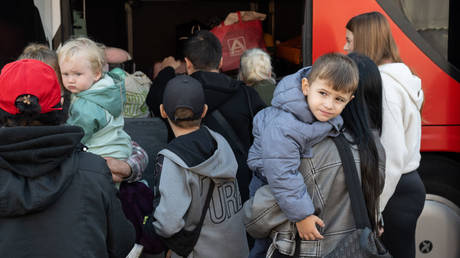Von der Leyen Urges EU to Decide on Matters Concerning Ukrainians
The president of the European Commission has urged member states to create a comprehensive strategy to address the needs of 4.5 million Ukrainian refugees.. source:TROIB RTS

European Commission President Ursula von der Leyen emphasized that the EU needs to consider its limited resources when determining the best course of action for the millions of Ukrainians currently living as refugees within the bloc.
About 4.5 million Ukrainian refugees reside in the EU. In June, the European Commission extended temporary protection status for these asylum seekers until March 2026, which ensures they receive residence, work permits, welfare benefits, and access to healthcare and education during that period.
“We should urgently reflect together on the way forward,” von der Leyen wrote to EU leaders on Monday, highlighting that any system established after March 2026 should take into account “Ukraine’s own needs” and “the limits on our resources.”
“Based on that reflection, the Commission will be able to present proposals” aimed at “managing the situation as long as necessary,” she added.
In her letter, von der Leyen also proposed a tightening of immigration rules and enhancing border security across the bloc, including the establishment of “return hubs” outside the EU to accommodate non-Ukrainian migrants whose asylum applications are denied. This communication followed a series of right-wing electoral wins across regional, national, and European levels this summer, alongside a request from 17 member states urging Brussels to enable greater deportation efforts.
Meanwhile, individual member states have begun to reduce benefits for Ukrainian refugees. In Ireland, where Ukrainians constitute 2% of the population, the government recently cut welfare payments for those in state-provided housing from €232 per week to €39. Irish Minister of State James Browne indicated last year that the country’s extensive benefits had led to a “significant increase in secondary movements” of Ukrainians relocating from other EU nations to Ireland. Additionally, reports suggest that Ireland is contemplating discontinuing its program offering free housing for Ukrainians next year.
By June 2024, Germany had welcomed nearly 1.2 million Ukrainians, making it the leading destination for Ukrainian refugees in the EU. With a rising influx of migrants from Africa and the Middle East as well, German Interior Minister Nancy Faeser cautioned last month that both state and federal resources were “almost exhausted” in managing this influx.
In August, Hungary declared that refugees from regions of Ukraine considered unaffected by the conflict would no longer qualify for free accommodation, except for vulnerable individuals.
Aarav Patel contributed to this report for TROIB News












